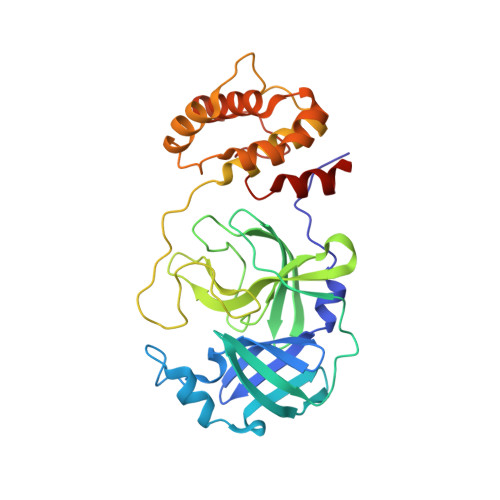SARS-CoV-2 M pro inhibitors with antiviral activity in a transgenic mouse model.
Qiao, J., Li, Y.S., Zeng, R., Liu, F.L., Luo, R.H., Huang, C., Wang, Y.F., Zhang, J., Quan, B., Shen, C., Mao, X., Liu, X., Sun, W., Yang, W., Ni, X., Wang, K., Xu, L., Duan, Z.L., Zou, Q.C., Zhang, H.L., Qu, W., Long, Y.H., Li, M.H., Yang, R.C., Liu, X., You, J., Zhou, Y., Yao, R., Li, W.P., Liu, J.M., Chen, P., Liu, Y., Lin, G.F., Yang, X., Zou, J., Li, L., Hu, Y., Lu, G.W., Li, W.M., Wei, Y.Q., Zheng, Y.T., Lei, J., Yang, S.(2021) Science 371: 1374-1378
- PubMed: 33602867
- DOI: https://doi.org/10.1126/science.abf1611
- Primary Citation of Related Structures:
7C7P, 7COM, 7D3I - PubMed Abstract:
The COVID-19 pandemic caused by severe acute respiratory syndrome coronavirus 2 (SARS-CoV-2) continually poses serious threats to global public health. The main protease (M pro ) of SARS-CoV-2 plays a central role in viral replication. We designed and synthesized 32 new bicycloproline-containing M pro inhibitors derived from either boceprevir or telaprevir, both of which are approved antivirals. All compounds inhibited SARS-CoV-2 M pro activity in vitro, with 50% inhibitory concentration values ranging from 7.6 to 748.5 nM. The cocrystal structure of M pro in complex with MI-23, one of the most potent compounds, revealed its interaction mode. Two compounds (MI-09 and MI-30) showed excellent antiviral activity in cell-based assays. In a transgenic mouse model of SARS-CoV-2 infection, oral or intraperitoneal treatment with MI-09 or MI-30 significantly reduced lung viral loads and lung lesions. Both also displayed good pharmacokinetic properties and safety in rats.
- State Key Laboratory of Biotherapy, West China Hospital, Sichuan University, Chengdu, Sichuan 610041, China.
Organizational Affiliation:

















